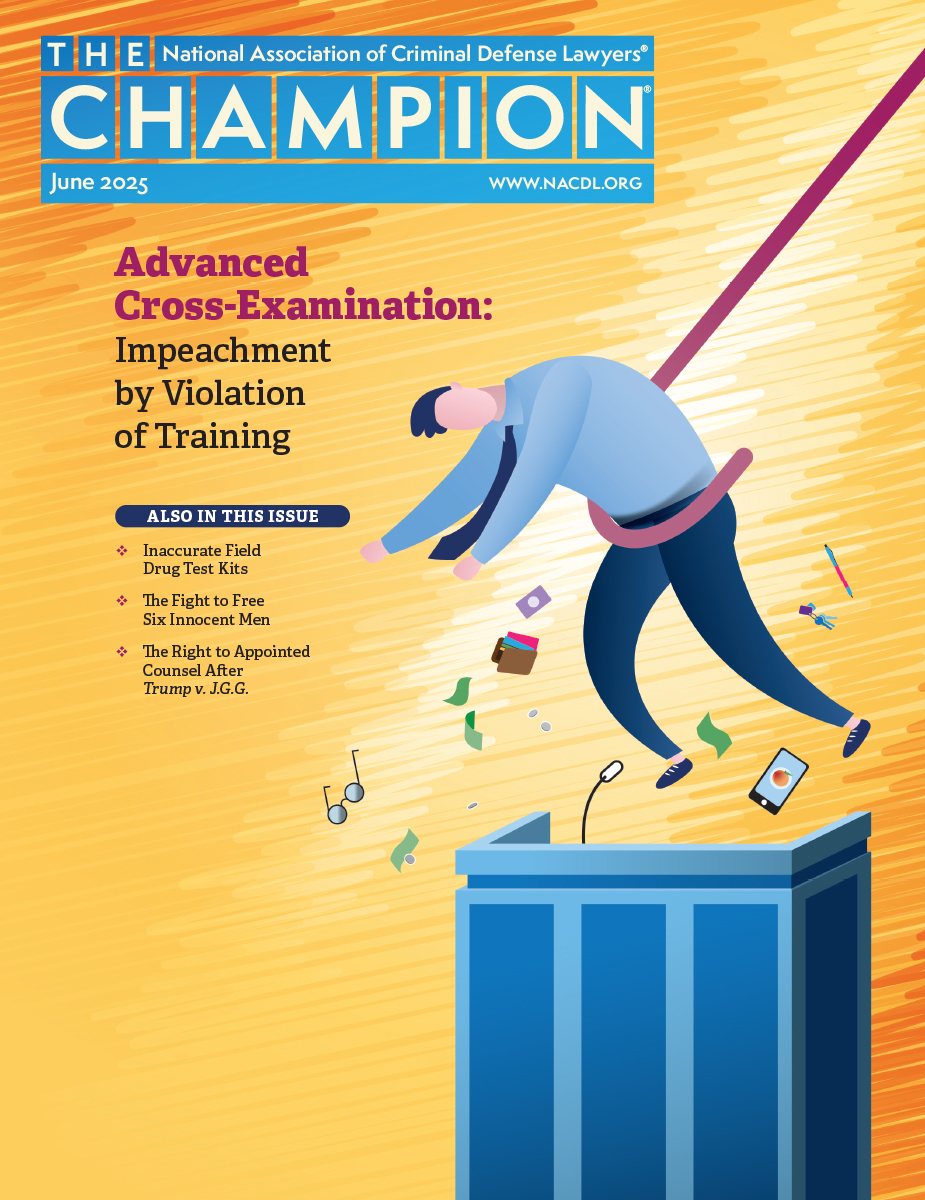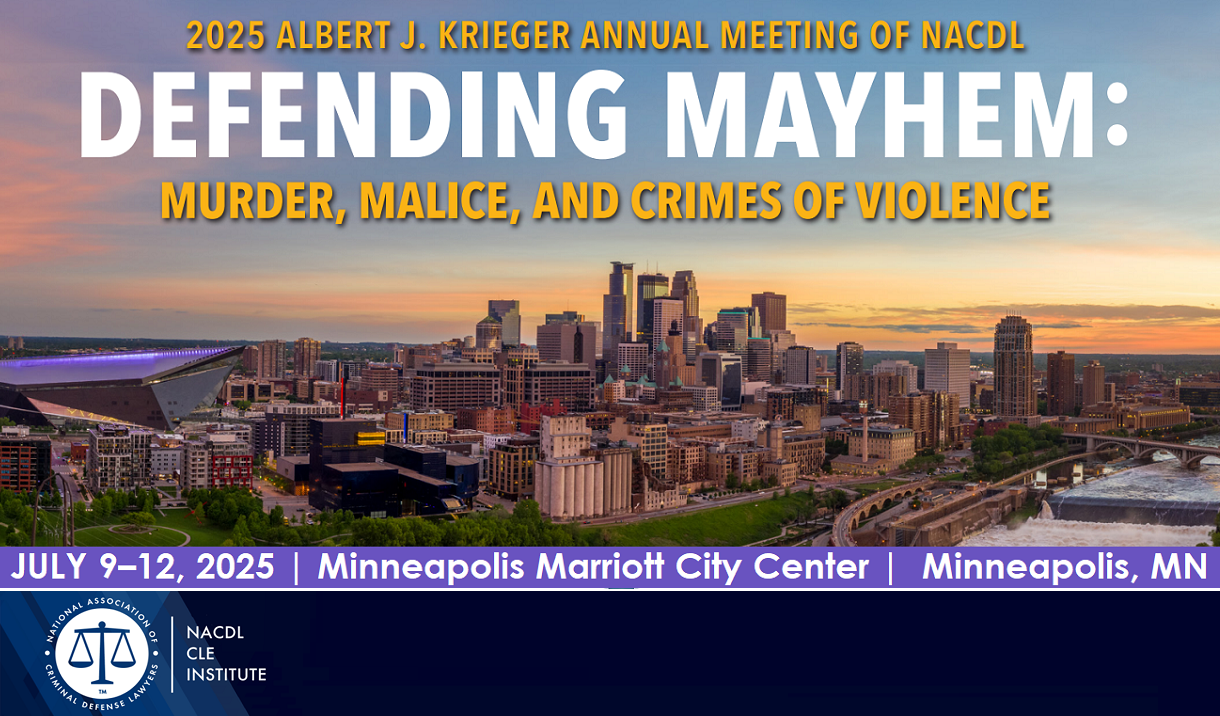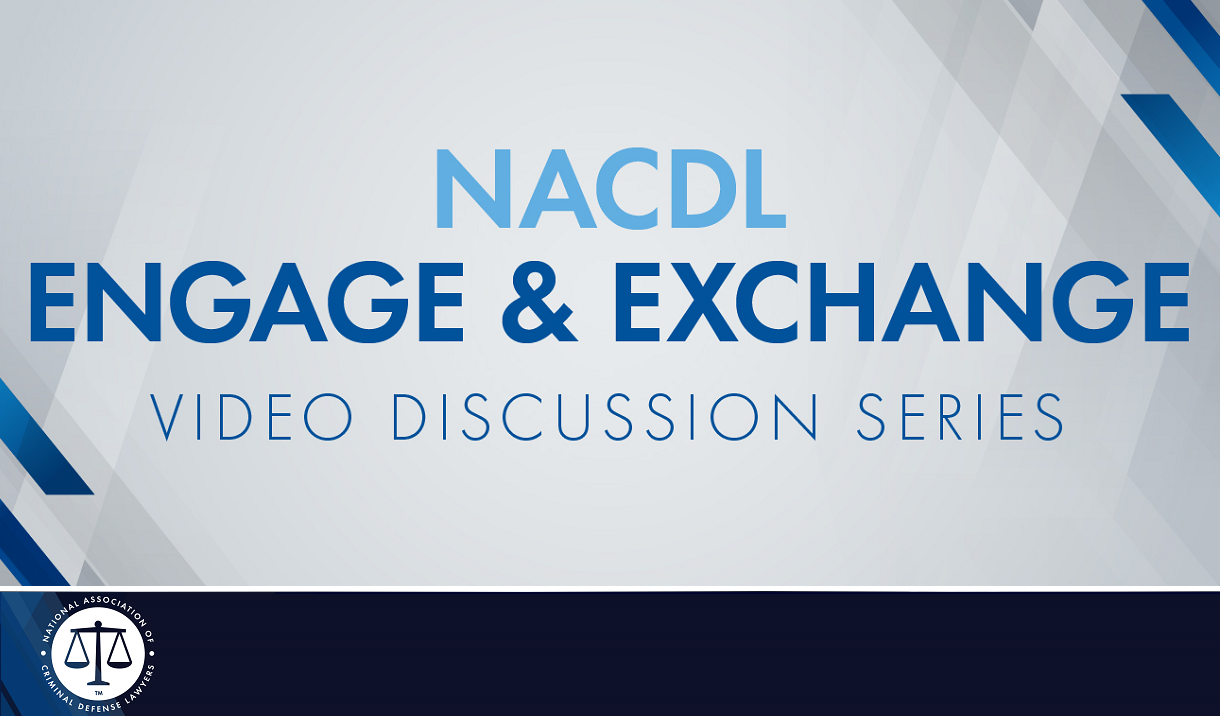Day 1: Sunday, April 28, 2024
| Time | Topic | Description (Speaker) |
| 6:00 pm – 6:30 pm | Welcome and Program Orientation | Introduce participants and faculty, with an overview of program and expectation setting for participants. |
| 6:30 pm – 8:00 pm | Theory of the Case Lecture | Participants will learn how to develop a theory of the case, incorporating facts beyond change, good facts and themes. (Kelli Childress) |
Day 2: Monday, April 29, 2024
| Time | Topic | Description |
| 8:45 am – 9:30 am | Storytelling Lecture | Participants will learn why storytelling is the most effective means of communication & how to use storytelling in all phases of case. (Andres Guevara) |
| 9:30 am – 10:15 am | Client Interviewing Lecture | Presentation on how to conduct an in depth interview: to obtain all necessary facts for trial defense, help with thedecision on whether client should testify, and build a meaningful relationship with a client. (Cathy Bennett) |
| 10:15 am – 10:30 am | Break | |
| 10:30 am – 12:00 pm | Breakout – Theory of the Case | Participants will work in small groups to brainstorm case theory and themes using case hypothetical. |
| 12:00 pm – 1:00 pm | Lunch (on your own) | |
| 1:00 pm – 2:30 pm | Theory of the Case and Mini Closing Breakout | Continuing the previous small group discussion, participants will give impromptu mini-closing arguments advancing case theory and theme and receive feedback from faculty. |
| 2:30 pm – 2:45 pm | Break | |
| 2:45 pm – 4:00 pm | Voir Dire Lecture and Demonstration | Presentation on how to use storytelling and case theme and theory in voir dire. Presentation will include demonstrations of technique. (Lisa Wayne) |
| 4:00 pm – 5:00 pm | Opening Statement Lecture and Demonstration | Presentation on giving an effective opening statement using storytelling method that incorporates theory and theme. Faculty will provide a demonstration of a thematic opening statement. (Bob Pepin) |
| 5:00 pm – 5:30 pm | Breakout: Brainstorm and Assign Voir Dire Chapters | Participants work in small group to identify voir dire chapters. |
| Day 2 Assignment | Prepare Opening and Voir Dire | Participants will prepare theme-based opening statement & voir dire questions to deliver in their small group on Day 3. |
Day 3: Tuesday, April 30, 2024
| Time | Topic | Description (Speaker) |
| 8:45 am – 11:45 am | Breakout – Opening Statements | Working in small groups, participants deliver opening statements based on case hypothetical, receiving feedback from faculty |
| 11:45 am – 1:00 pm | Lunch (on your own) | |
| 1:00 pm – 3:00 pm | Breakout – Voir Dire | Working in small groups, participants conduct voir dire using mock jurors recruited from the community. |
| 3:00 pm – 3:15 pm | Break | |
| 3:15 pm – 4:30 pm | Cross Examination Lecture and Demonstration | Presentation on basic and advanced rules of cross examination using the chapter method. Faculty will provide a demonstration of cross examination techniques. (Byron Conway) |
| 4:30 pm – 5:15 pm | Impeachment Lecture and Demonstration | Presentation on effective impeachment of witnesses using the Recommit, Accredit, Confront (RAC) method. Faculty will provide a demonstration of RAC technique. (Bridget Krause) |
| Day 3 Assignment | Prepare Cross Examination | Participants prepare cross examination chapters based on the case hypothetical. |
Day 4: Wednesday, May 1, 2024
| Time | Topic | Description (Speaker) |
| 8:45 am – 9:45 am | Breakout – Brainstorm Cross Chapters | Working in small groups, attendees will develop their chapters for cross examination, including discussions and decision-making on effective sequencing. |
| 9:45 am – 10:45 am | Preparation Time | Continuing work in small groups, participants will be given additional time to work with faculty on developing their cross examination. |
| 10:45 am – 12:15 pm | Breakout – Cross Examination Impeachment Cross | Continuing to work in small groups, participants will conduct cross examination of mock witnesses (played by actors). Cross examination will focus on impeachment. |
| 12:15 pm – 1:15 pm | Lunch (on your own) | |
| 1:15 pm – 3:30 pm | Breakout – Cross Examination | Continuing to work in small groups, participants will do lengthier chapters of cross examination of mock witnesses (played by actors). |
| 3:30 pm – 3:45 pm | Break | |
| 3:45 pm – 4:45 pm | Direct Examination Lecture | Presentation on conducting a thematic direct examination that incorporates storytelling techniques. (Deja Vishny) |
| 4:45 pm – 5:15 pm | Demonstrative Evidence Lecture | Presentation on how to use exhibits and conduct demonstrations in court. (Juval Scott) |
| Day 4 Assignment | Prepare Direct Examination | Participants will interview each other. |
Day 5: Thursday, May 2, 2024
| Time | Topic | Description (Speaker) |
| 9:00 am – 10:30 am | Breakout – Direct Examination | Working in small groups, participants conduct direct examinations of on another using the information gained from their interviews. |
| 10:30 am – 10:45 am | Break | |
| 10:45 am – 12:00 pm | Evidence and Objections Lecture | Presentation on preparing, identifying, and arguing evidentiary issues, with special emphasis on in-trial issue spotting, objections, and arguments. (Callie Steele) |
| 12:00 pm – 1:00 pm | Lunch (on your own) | |
| 1:00 pm – 3:00 pm | Evidence Exercises | Working in small groups, participants conduct evidentiary drills where they must rapidly object or respond to their opponent’s objections. |
| 3:00 pm – 3:15 pm | Break | |
| 3:15 pm – 4:15 pm | Closing Argument Lecture and Mini Demonstration | Presentation on preparing and delivering an effective, thematic, closing argument and a faculty demonstration on how to effectively argue reasonable doubt in closing. (Heather Rogers) |
| 7:00 pm | Karaoke Party Night | |
| Day 5 Assignment | Prepare Closing Argument | Using the case hypothetical, participants to prepare a closing argument. |
Day 6: Friday, May 3, 2024
| Time | Topic | Description |
| 9:00 am – 11:00 am | Closing Argument Breakout | Working in small groups, participants will deliver closing arguments, receiving feedback from faculty. |
| 11:00 am – 11:45 am | Closing Argument Demonstration | Faculty member will demonstrate a closing argument using the case hypothetical. (Marilyn Bednarski) |
| 11:45 am – 12:00 pm | Program Wrap Up | Closing remarks and program evaluations |












